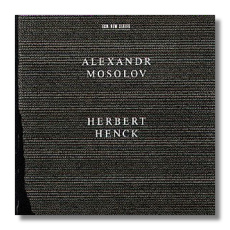
The Internet's Premier Classical Music Source
Related Links
- Latest Reviews
- More Reviews
-
By Composer
-
Collections
DVD & Blu-ray
Books
Concert Reviews
Articles/Interviews
Software
Audio
Search Amazon
Recommended Links
Site News
 CD Review
CD Review
Alexander Mosolov

Piano Music
- Sonata #2 in B minor, Op. 4 (1923-1924)
- Deux Nocturnes, Op. 15 (1925 / 1926)
- Sonata #5 in D minor, Op. 12 (1925)
Herbert Henck, piano
Recorded in Frankfurt, March 1995
Produced by Manfred Eicher
ECM New Series 1569 (449460)
Alexander Mosolov (1900-1973), too, uses his own distinctive scheme of tonal organisation, different from Roslavets, and different from the Vienna School as well. His sonatas are technically very complex and difficult, and symphonically oriented, exploiting the full resources of the modern instrument. The noctures are miniatures, less driven, less intense, gentler, but dark and brooding, a melancholy night, gloomy with a few glints of light.
Most of Mosolov's music is filled with raging passion and dark colors, sadness, despair, longing, resignation, no resolution, and no triumph. His expression markings include "lugubre" and "feroce" and dozens of shades in between. This represents his emotional range. Thematic material is obscure, no melodies, fragments of themes, shreds and shards projected with furious intensity, driven, but (certainly in this performance) not mechanical or motoric. This is in spite of Mosolov's Futurist leanings and links with "machine music." He always makes us aware of the piano as a mechanical device, but never merely that.
Herbert Henck puts this difficult material across in a beautiful, spirited performance and finds a lot of lyricism behind an often forbidding surface. (But when you're done listening you still won't remember any of the tunes.)
The recording and production are up to the highest possible standards, as with all of ECM's releases, which are unsurpassed. The liner notes, by the performer, are exemplary and show him to be as eloquent on paper as he is on the keyboard. The notes significantly enhance the enjoyment and understanding of the music.
Copyright © 1997, Paul Geffen


















